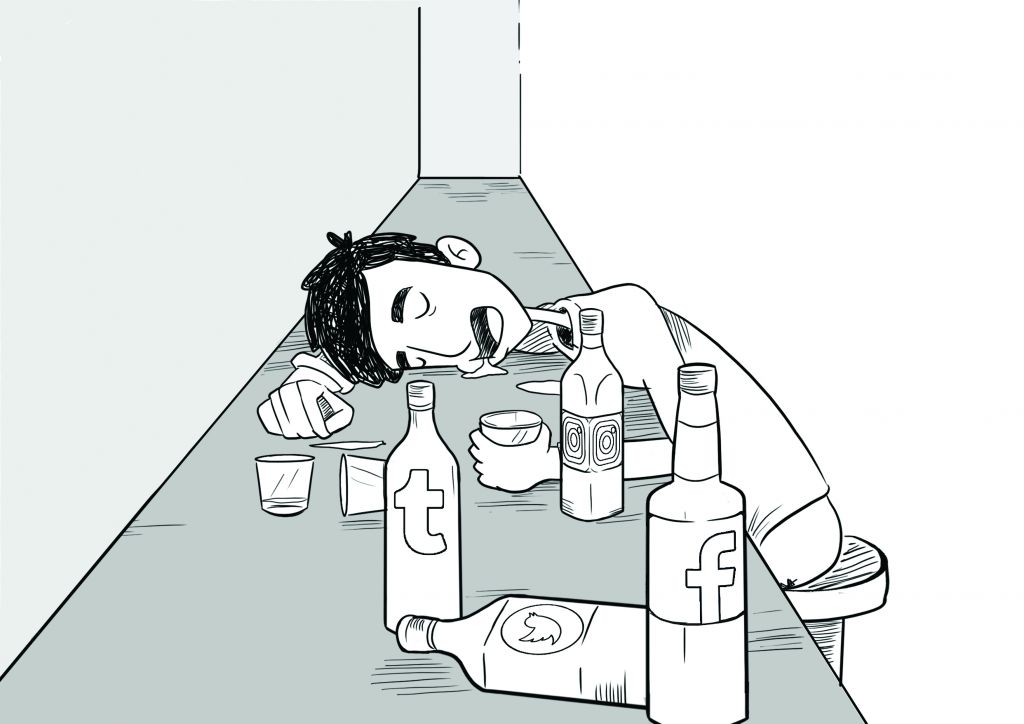Social media is dangerous.
It’s so dangerous, in fact, that online interaction and digital media consumption should be thought of the same way as alcohol consumption. That is, it’s fine — in moderation.
But for all of its conveniences and benefits, when taken too far, it has the potential to destabilize lives and degrade mental well-being.
Students at this college and other campuses around the world are the test generation for this technology. There’s simply no precedent for the kind of innovation the human race is experiencing in this 21st century. The scope of social media’s reach is massive. In the western world, society has adapted to become almost dependent on it.
For Algonquin students, avoiding the dangers of social media comes down to one thing: responsibility. The overuse and irresponsible use of social media can have toxic impacts on our lives.
Irresponsible social media use happens often, whether we realize it or not, and there’s very little conversation about it. In a sense, this is social media’s fatal flaw. Because it is so big, so widely used for so very many things, we’ve created the conditions for the technology to invisibly steal some of our happiness.
Any psychologist will tell you that comparing yourself to others isn’t a good practice. Objectively, we’re taught that the differences between our life and someone else’s shouldn’t matter, but naturally this is how we want to define our success and identity. It happens, but we should try not to do it.
With the advent of social media, we can now constantly compare ourselves to everyone we know, and also everyone we don’t know who cares to post on an open account. With quite literally one or two swipes of a phone screen you can see what everyone else is doing.
The result is that, on a good day, it’s possible to happily browse social media without comparing one’s situation to others’. Whereas on a bad day, it might feel like everyone else has it better than us.
Life satisfaction is a fickle thing. It depends on a lot of variables, but often comes down to mood. When stressed or anxious, our perception can be distorted, making life feel less satisfying than when we are calm and content.
In 2013, Ethan Kross of the University of Michigan ran a study testing the effect of social media on subjective well-being. Simply put, subjective well-being is a scientific measure of happiness, i.e. the overall level of satisfaction felt by an individual regarding his or her life’s circumstances.
Kross’s study concluded with a very clear indication that the more a test subject used Facebook throughout the day, the less life satisfaction they felt. Conversely, the more real-world interaction the subject had between Facebook usage, the better they felt. Scientifically speaking, using Facebook too much makes you unhappy.
However social media is a source of entertainment, and using it makes us feel good. It can also be a source of personal affirmation: every “like” reminds us that there’s someone out there who cares. Even if intellectually we know the “likes” are meaningless, somehow each one is like a little boost of self-esteem and people can become hooked on that feeling.
In 2012, Cecilie Schou Andreassen from the University of Bergen created the Bergen Facebook Addiction Scale as part of a larger Facebook addiction research project. According to the scale, the more someone can consciously remember factors like actively planning how to use Facebook, using it as a distraction from their real-life stresses and feeling anxious when unable to check it, the higher their level of “addiction” becomes.
These are well-funded peer-reviewed research studies from credible institutions that all more or less point in the same direction: be mindful of your scrolling.
We need to take this conversation about responsible use of social media from the academic world and bring it into the mainstream.
It’s generally accepted that sitting alone with a drink and zoning out instead of doing homework isn’t an option. We should treat our social media with the same respect.


